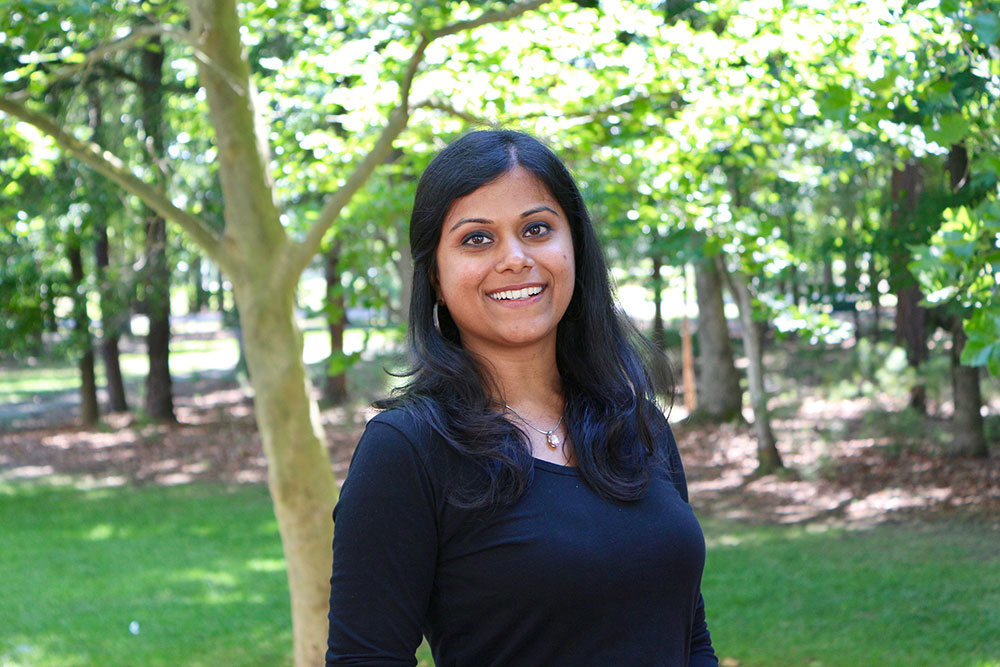Priyashree Roy has been awarded the 2016 JSA Thesis Prize for experimental research on proton excited states.
Priyashree Roy has been awarded the 2016 JSA Thesis Prize for experimental research on proton excited states.
NEWPORT NEWS, VA – When it comes to laying bare the secrets of the proton, Priyashree Roy’s efforts at the Thomas Jefferson National Accelerator Facility have already contributed a whole swath of new information useful to researchers. Now, the thesis she wrote about her work has earned her the 2016 Jefferson Science Associates Thesis Prize.
Roy’s thesis research was focused on the proton’s spectrum of excited states. These excited states are produced when a proton is given extra energy.
“By mapping out the spectrum of excited states and looking for some kind of pattern in this spectrum, we get an insight into what’s going on - what the dynamics are inside this proton,” Roy explained.
To produce and study these states, protons in a target material were imparted with extra energy by a beam of high-energy photons. The target and/or the beam may be polarized –meaning the particles in the target and/or the beam have been set to all spin in a preferred direction. The experimenters carefully tuned the polarizations of the target and beam during the experiment.
By comparing the different results from this polarization tuning, Roy was able to extract so-called polarization observables. These observables, including 10 that had never before been measured, can be used by researchers to help identify the excited states.
“The excited states of the proton are very broad and overlapping. To disentangle them, we need polarized measurements, because that gives us additional information. That’s where these polarization observables become very important,” she said. “In my thesis, I extracted 13 polarization observables. These observables, and the 10 first-time measurements, specifically, provide new information to improve existing models and tools for understanding the proton’s spectrum.”
Roy’s work is described in her Ph.D. thesis, titled “Measurement of Polarization Observables in Vector Meson Photoproduction Using a Transversely-Polarized Frozen-Spin Target and Polarized Photons at CLAS, Jefferson Lab.” She completed the research while pursuing her Ph.D. at Florida State University with oversight from thesis advisor Volker Crede, an associate professor at Florida State.
The JSA Thesis Prize is awarded annually for the best Ph.D. student thesis on research related to Jefferson Lab science and includes a $2,500 cash award and a commemorative plaque. Nominations for the JSA Thesis prize are judged on four criteria: the quality of the written work, the student's contribution to the research, the work's impact on the field of physics, and service (how the work benefits Jefferson Lab or other experiments).
In addition, the recipient presents his or her work during a session at the Jefferson Lab Users Group’s annual meeting. Users are the scientists, from across the U.S. and from 29 countries, who conduct fundamental nuclear physics experiments with Jefferson Lab’s research facilities and capabilities. The Users Group Board of Directors oversees the winner selection process.
“We received a lot of excellent nominations for the JSA Thesis Prize. It was a pleasure to read the different theses and very challenging to select the winner,” said Larry Weinstein, 2016-2017 chair of the UGBoD and professor and eminent scholar at Old Dominion University. “I thank Julie Roche, Vice Chair of the User Group, for organizing the thesis prize selection process.”
“I am honored and overwhelmed to receive this prestigious award. I know that there are so many important theses underway at Jefferson Lab, and to be chosen as the best is really an honor. In this regard, I am very thankful to JSA and the UGBoD for taking the initiative every year to support the prize,” Roy said. ”I must say that no scientific work these days is a lone endeavor, therefore I am sincerely thankful to the entire FROST collaboration for their excellent teamwork and for making the experiment successful. In particular, I would like to thank Volker Crede, Eugene Pasyuk and Kenneth Livingston for their valuable guidance and support.”
After graduating last year, Roy joined the University of Michigan as a postdoctoral fellow in December 2016. Now, she is hard at work on research for the MUSE experiment, which aims to resolve the ‘proton radius puzzle’ - the discrepancy in determinations of the proton’s electric charge radius between two methods of measurements: muon spectroscopy and electron scattering.
“I have branched out a little bit, but the object of interest has remained the same,” she said.
The JSA Thesis Prize was established in 1999 by the Southeastern Universities Research Association and is now one of many projects supported by the JSA Initiatives Fund Program, which was established by Jefferson Science Associates to support programs, initiatives and activities that further the scientific outreach, and promote the science, education and technology missions of Jefferson Lab in ways that complement its basic and applied research focus. Initiatives Fund awards are for those projects that benefit the lab user community and that leverage commitments of others.
Contact: Kandice Carter, kcarter@jlab.org, 757-269-7263


